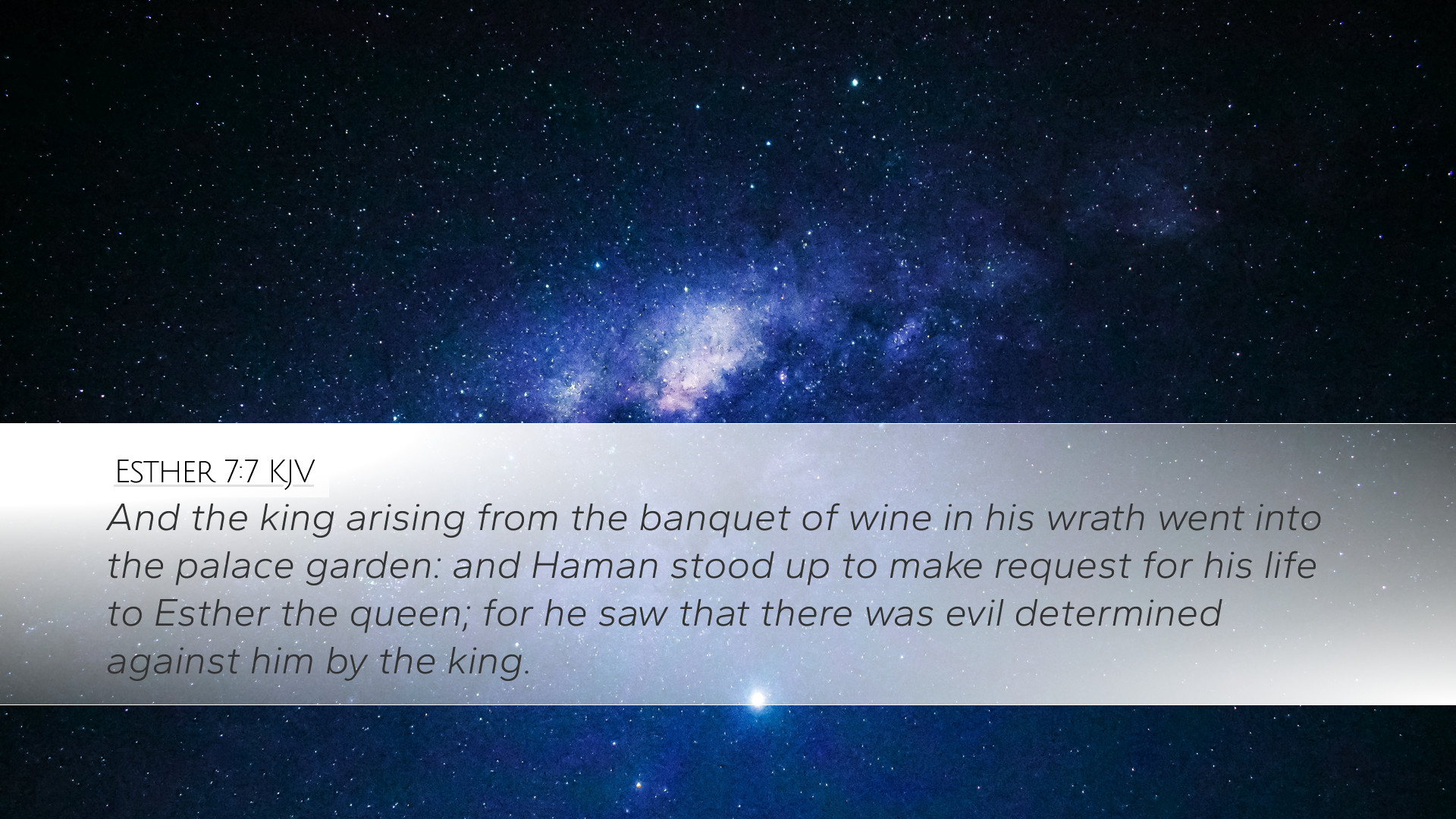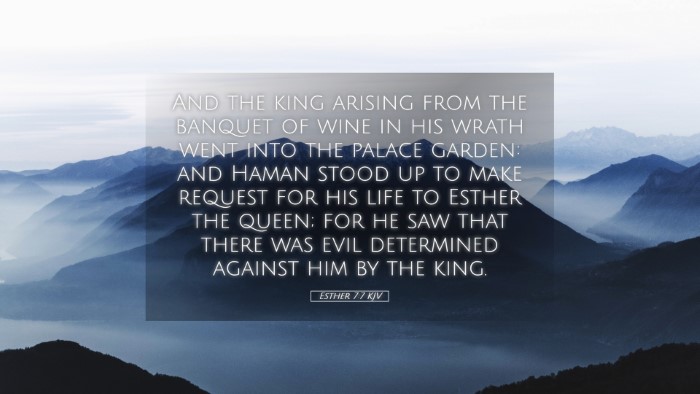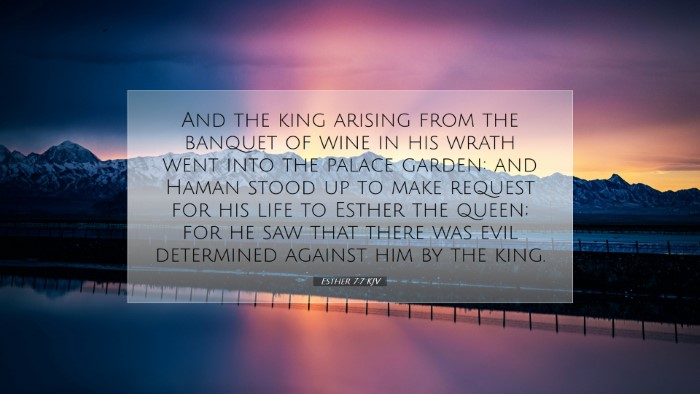Old Testament
Genesis Exodus Leviticus Numbers Deuteronomy Joshua Judges Ruth 1 Samuel 2 Samuel 1 Kings 2 Kings 1 Chronicles 2 Chronicles Ezra Nehemiah Esther Job Psalms Proverbs Ecclesiastes Song of Solomon Isaiah Jeremiah Lamentations Ezekiel Daniel Hosea Joel Amos Obadiah Jonah Micah Nahum Habakkuk Zephaniah Haggai Zechariah MalachiEsther 7:7
Esther 7:7 KJV
And the king arising from the banquet of wine in his wrath went into the palace garden: and Haman stood up to make request for his life to Esther the queen; for he saw that there was evil determined against him by the king.
Esther 7:7 Bible Commentary
Commentary on Esther 7:7
Verse Reference: Esther 7:7 - “And the king arose in his wrath from the banquet of wine, and went into the palace garden: and Haman stood up to make request for his life to Esther the queen; for he saw that there was evil determined against him by the king.”
Introduction
The narrative in Esther 7:7 marks a crucial turning point in the story of Esther, highlighting themes of justice, divine providence, and the overturning of the wicked. This commentary synthesizes insights from several public domain sources, offering theological reflections conducive to the study of pastors, students, and scholars alike.
Contextual Background
In approaching Esther 7:7, one must consider the preceding events that set the stage for this moment. Haman, the king’s advisor, had plotted to annihilate the Jewish people, which prompted Esther to leverage her position for intercession. The king’s banquet, a significant cultural setting, becomes the backdrop for revelation and subsequent wrath.
Exegesis of the Verse
Matthew Henry remarks on the emotional intensity of the king's reaction. His departure from the banquet reflects not only personal indignation but symbolizes a pivotal switch in loyalty—from Haman to Esther and her people. This underscores the context of moral choices and the repercussions of wicked schemes.
Albert Barnes expands on the king's mood, emphasizing that his wrath was not directed at Esther but at Haman—the architect of the treachery. The phrase "from the banquet of wine" indicates that the king's pleasure has turned into rage, representing the transition from indulgence to revelation.
Adam Clarke notes the psychological dynamics at play: Haman, in a state of desperation as the king retreats, anticipates his impending doom and turns to Esther not just for mercy, but in a position of vulnerability. This moment encapsulates the biblical principle of reaping what one sows (Galatians 6:7).
The King's Anger
- The Nature of Anger: The king's rage signals divine justice unfolding. It evokes a reflection on how God often uses rulers to enact his will, a recurring theme throughout Scripture.
- The Symbolism of the Garden: The garden here can be interpreted as a place of tranquillity, contrasting with the mounting chaos. It illustrates the bittersweet reality that evil can co-exist with moments of peace.
Haman's Desperation
Haman’s act of standing up to plead for his life before Esther encapsulates the tragedy of pride and downfall. Haman’s earlier arrogance is met with a desperate supplication, revealing the depth of his moral failure. Matthew Henry highlights that Haman’s plea for mercy emphasizes the futility of human schemes against divine providence.
Barnes notes that Haman’s actions in seeking Esther’s favor show a profound shift in power dynamics. His desperation is palpable as he recognizes Esther's influence with the king and thus clings to any hope of redemption.
Theological Implications
- Divine Justice: This verse illustrates the biblical principle that those who plot evil ultimately face judgment. As Clarke comments, the wicked often deceive themselves into a false sense of security, but God’s timing ensures that justice prevails.
- God’s Sovereignty: The unfolding narrative in Esther reinforces the belief in divine providence. God orchestrates events leading to a climactic confrontation between Esther and Haman, revealing His hand behind the scenes.
Practical Applications
For pastors and leaders, this verse serves as a reminder of the importance of integrity and the consequences of transgressions. The prophetic example demonstrated by Esther challenges believers to stand courageously for truth and justice, even in the face of overwhelming odds.
The desperation of Haman serves as a warning against hubris and a call to humility. Ministry contexts can also draw parallels from Esther's intercession, urging congregations to advocate for those marginalized or oppressed within society.
Concluding Thoughts
Esther 7:7 captures a dramatic moment laden with emotion and significance, imprinting upon the reader the undeniable consequences of evil intentions. The interplay between Esther's bravery and Haman’s downfall provides fertile ground for reflection on God's justice and the human condition. As scholars and theologians delve into this passage, they uncover insights that speak not only to the historical and cultural contexts but also to the timeless truth of God’s governing authority over human affairs.


